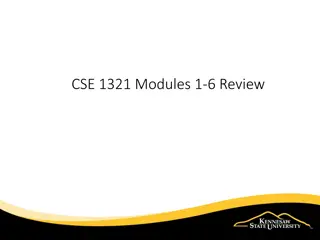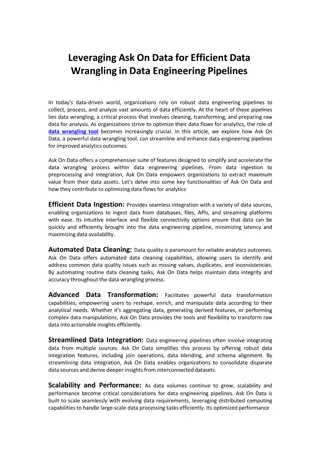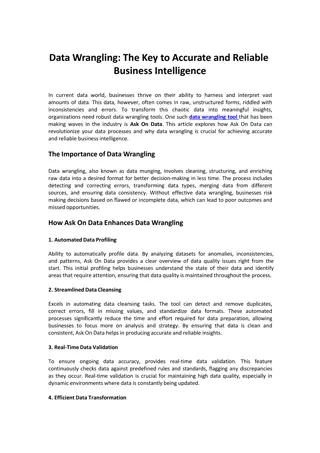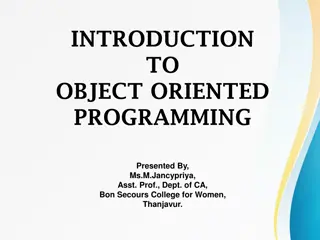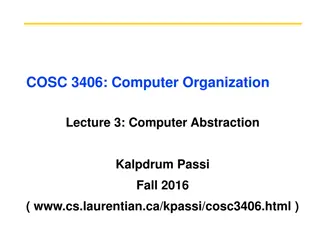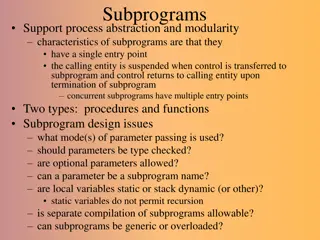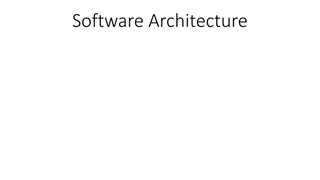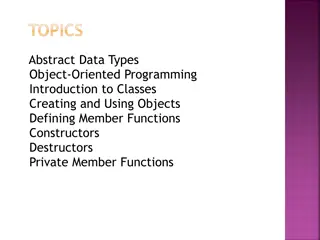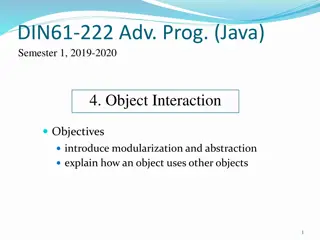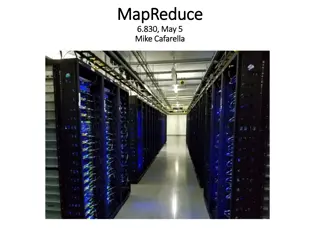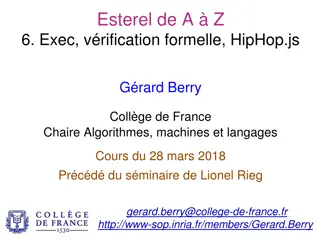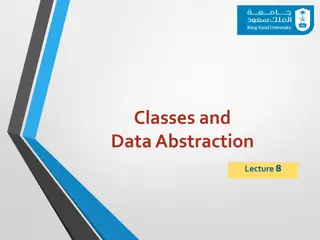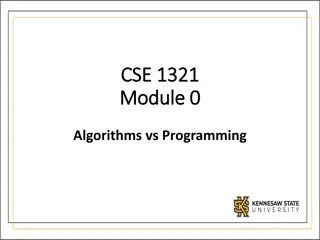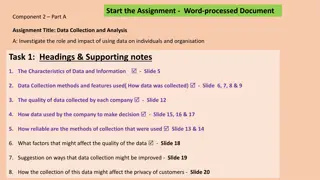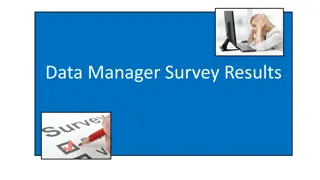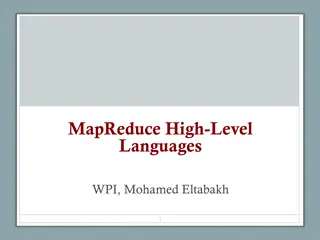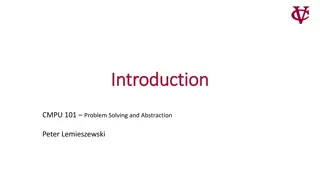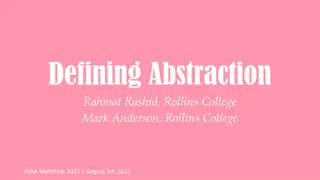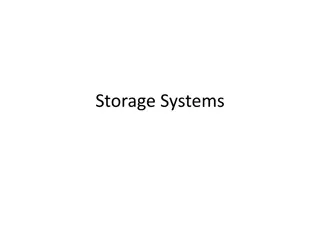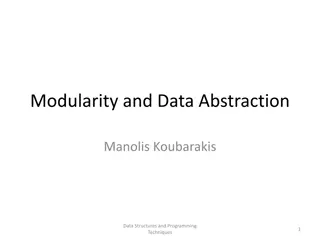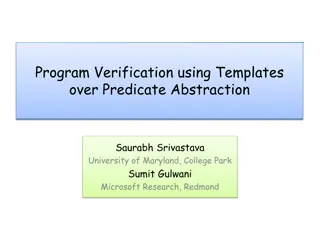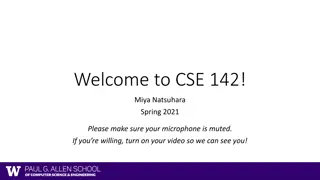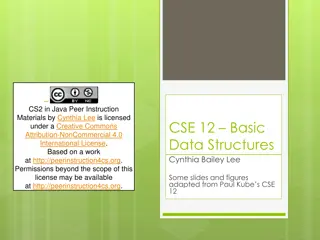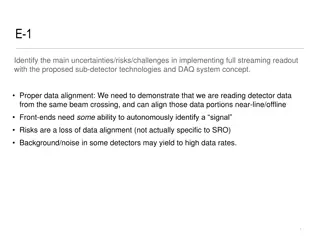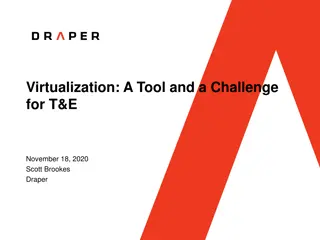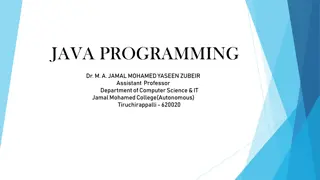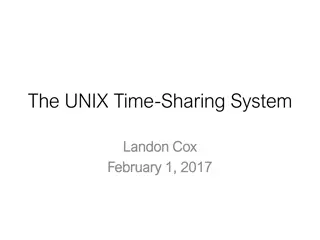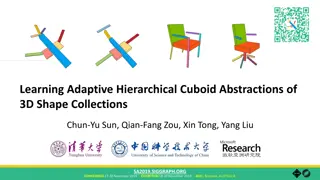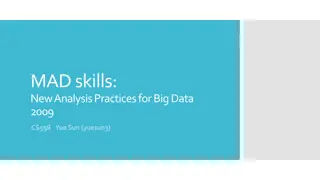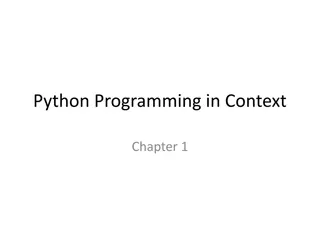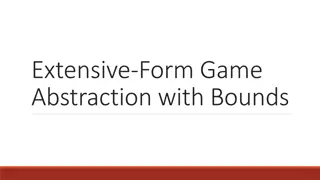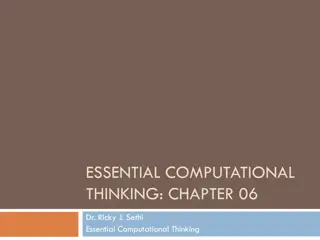Water Management Strategies for Efficiency and Sustainability in Supply Systems
Customers with metered water supply are more water-efficient, promoting metering can increase awareness. Options include meter optants, metering on change of occupancy, supply pipe renewal, water efficiency, consumption data audits, and commercial water efficiency. Distribution management focuses on
1 views • 6 slides
Understanding Algorithms and Programming Fundamentals
Learn about algorithms, programming, and abstraction in computing. Explore the definition and properties of algorithms, the relationship between algorithms and programming, and the concept of abstraction. Discover how algorithms are like recipes and how abstraction simplifies complex tasks in comput
1 views • 17 slides
Network Function Abstraction A delicate question of (CPU) affinity?
Exploring the delicate balance of CPU affinity in network function abstraction, including challenges, benefits, and solutions like CPU pinning for network workloads. Learn about the impact on performance and scalability, as well as the importance of proper configuration in virtual and physical envir
3 views • 40 slides
Understanding Algorithms and Abstraction Concepts in Programming
Exploring algorithms as logical steps to accomplish tasks and abstraction as a way to group concepts for clarity in programming. Dive into flowcharts for sorting algorithms, pseudocode skeletons, and code snippets in various languages like C#, Java, and C++. Learn about handling variables and user i
2 views • 48 slides
Ask On Data for Efficient Data Wrangling in Data Engineering
In today's data-driven world, organizations rely on robust data engineering pipelines to collect, process, and analyze vast amounts of data efficiently. At the heart of these pipelines lies data wrangling, a critical process that involves cleaning, transforming, and preparing raw data for analysis.
2 views • 2 slides
Data Wrangling like Ask On Data Provides Accurate and Reliable Business Intelligence
In current data world, businesses thrive on their ability to harness and interpret vast amounts of data. This data, however, often comes in raw, unstructured forms, riddled with inconsistencies and errors. To transform this chaotic data into meaningful insights, organizations need robust data wrangl
0 views • 2 slides
Understanding Object Oriented Programming (OOP) Principles
Object-Oriented Programming (OOP) is a software design approach where programmers define data structures and operations. Key principles include objects, classes, data encapsulation, inheritance, polymorphism, and data abstraction. OOP allows for better organization and reusability of code, fostering
0 views • 15 slides
Understanding Data Governance and Data Analytics in Information Management
Data Governance and Data Analytics play crucial roles in transforming data into knowledge and insights for generating positive impacts on various operational systems. They help bring together disparate datasets to glean valuable insights and wisdom to drive informed decision-making. Managing data ma
0 views • 8 slides
Understanding Computer Abstraction and Performance Metrics
Computer abstraction, instruction count, CPI, and performance metrics like clock cycles, CPU time, and program execution are crucial concepts in computer organization. Through examples and detailed explanations, this lecture explores how architecture, instruction sets, compilers, and algorithms impa
0 views • 27 slides
Overview of Subprograms in Software Development
Subprograms in software development provide a means for abstraction and modularity, with characteristics like single entry points, suspension of calling entities, and return of control upon termination. They encompass procedures and functions, raising design considerations such as parameter passing
4 views • 25 slides
Understanding Software Architecture Patterns
Software architecture refers to the high-level structures of a system, including architectural patterns that provide reusable solutions to common problems. Architectural patterns like Layered, Client-server, and Master-slave help in breaking down large systems for better management and maintenance.
5 views • 33 slides
Computational Thinking, Algorithms & Programming Overview
This unit covers key concepts in computational thinking, including decomposition, abstraction, and algorithmic thinking. Decomposition involves breaking down complex problems, abstraction focuses on identifying essential elements, and algorithmic thinking is about defining clear instructions to solv
1 views • 5 slides
Introduction to Object-Oriented Programming and Data Abstraction
Introduction to object-oriented programming concepts including classes, objects, member functions, constructors, destructors, and abstract data types. Exploring the principles of abstraction in software development, passing objects to functions, and understanding the limitations of procedural progra
0 views • 47 slides
Understanding Modularization and Abstraction in Object-Oriented Programming
Modularization in programming involves breaking down complex problems into simpler sub-parts, while abstraction allows combining low-level details into higher levels. By using modules and abstract classes, software development becomes more manageable and efficient, especially in object-oriented prog
0 views • 39 slides
Understanding MapReduce for Large Data Processing
MapReduce is a system designed for distributed processing of large datasets, providing automatic parallelization, fault tolerance, and clean abstraction for programmers. It allows for easy writing of distributed programs with built-in reliability on large clusters. Despite its popularity in the late
0 views • 52 slides
Formal Verification and Automata Abstraction in Esterel
This content delves into the applications of formal verification and automata abstraction in Esterel, focusing on techniques such as verification by abstraction of automata, boolean verification using BDDs, bounded model checking in SAT/SMT, and more. The work of Gérard Berry at the Collège de Fra
0 views • 38 slides
Understanding Classes and Data Abstraction in Object-Oriented Programming
Object-oriented programming (OOP) encapsulates data and functions into classes, akin to blueprints for creating objects. This lecture delves into the relationship between classes, objects, data members, member functions, and user-defined types. It emphasizes the reuse and encapsulation of code, info
5 views • 22 slides
Understanding Algorithms and Programming: A Visual Introduction
Explore the fundamental concepts of algorithms and programming through visual representations and practical examples. Learn about algorithmic thinking, abstraction, recipe-like algorithms, and the importance of logical steps in accomplishing tasks. Discover how algorithms encapsulate data and instru
1 views • 17 slides
Satisfiability Modulo Abstraction for Separation Logic with Linked Lists
This study explores the application of satisfiability modulo abstraction in separation logic with linked lists. It presents a technique using abstract interpretation concepts to handle separation logic formulas beyond previous methods, specifically focusing on over-approximating heaps that satisfy t
0 views • 41 slides
Understanding Data Collection and Analysis for Businesses
Explore the impact and role of data utilization in organizations through the investigation of data collection methods, data quality, decision-making processes, reliability of collection methods, factors affecting data quality, and privacy considerations. Two scenarios are presented: data collection
1 views • 24 slides
Analysis of Data Manager Survey Results in VQI Abstraction
Survey results gathered from 942 notified Data Manager users in VQI abstraction revealed insights on responsibilities, experience levels, backgrounds, and facility types. Responses indicate varying levels of involvement with data collection, team size, and number of facilities managed, providing val
0 views • 27 slides
Understanding Object-Oriented Programming (OOP) in Python
Object-Oriented Programming (OOP) is a programming paradigm that focuses on organizing code into objects with attributes and behaviors. Python supports various OOP concepts such as classes, objects, inheritance, polymorphism, abstraction, and encapsulation. Classes serve as blueprints for creating o
0 views • 29 slides
Understanding High-Level Languages in Hadoop Ecosystem
Explore MapReduce and Hadoop ecosystem through high-level languages like Java, Pig, and Hive. Learn about the levels of abstraction, Apache Pig for data analysis, and Pig Latin commands for interacting with Hadoop clusters in batch and interactive modes.
0 views • 27 slides
Introduction to CMPU 101: Problem Solving and Abstraction
An exploration of Computer Science through the lens of computation, algorithms, and data structures. Discover the essence of problem-solving in the realm of computing, illustrated with examples and definitions from a foundational textbook. Follow a step-by-step guide to computational problem-solving
0 views • 15 slides
Exploring Abstraction in Mathematics: Insights from MAA MathFest 2022
Delve into the concept of abstraction with a focus on diverse perspectives, historical influences, pedagogical approaches, and the process of abstraction itself as discussed at MAA MathFest 2022. Engage with enlightening comparisons and references shedding light on this fundamental mathematical prin
0 views • 7 slides
Understanding Portraits: Realism, Abstraction, and Representation
Delve into the world of portraiture with a focus on realism and abstraction, exploring how artists like Cézanne, Vermeer, and Picasso depict their subjects. Learn the significance of portraits, the difference between realistic and abstract art, and the impact of color on portraying emotions and pro
0 views • 7 slides
Understanding File Systems and Storage Devices in Computer Systems
Learn about the abstraction on top of physical storage devices, including magnetic disks and flash memory, and how file systems provide useful abstractions to manage and store data effectively. Explore the performance characteristics, crash tolerance, and access control features of file systems, as
0 views • 43 slides
Understanding Modularity and Data Abstraction in Programming
Learn about the importance of procedural abstraction, information hiding, modules, and abstract datatypes in programming. Discover how these concepts help in structuring large programs, improving maintainability, and enhancing data organization and operation control.
0 views • 56 slides
Program Verification Using Templates Over Predicate Abstraction
This research explores a technique that allows for inferring invariants with arbitrary quantification and boolean structure, improving the state-of-the-art in program verification. It can infer weakest preconditions, helping with debugging and analysis by discovering worst-case inputs and missing pr
0 views • 32 slides
CSE 142 Spring 2021 Wrap-Up Summary and Learning Objectives
This summary covers the essential aspects of the CSE 142 course in Spring 2021. It includes learning objectives such as writing Java programs, functional decomposition, control structures, data abstraction, and code quality. Additionally, it outlines topics like methods, loops, conditionals, file I/
0 views • 11 slides
Peer Instruction in Java: Enhancing Learning Experience
Explore the world of data structures through peer instruction in Java with Cynthia Lee. This approach involves interactive group discussions, problem-solving, and hands-on activities to deepen understanding of key concepts. The course covers topics such as ADTs, APIs, algorithm analysis, object-orie
0 views • 23 slides
Challenges and Common Solutions in Implementing Full Streaming Readout for Sub-Detector Technologies
Implementing full streaming readout with proposed sub-detector technologies and DAQ system concept poses challenges including proper data alignment, risks of data loss, and background noise affecting data rates. The transition point for electronic components from detector-specific to common solution
0 views • 9 slides
Understanding Virtualization: Hardware Abstraction and Hypervisor Concepts
Dive into the world of virtualization with a focus on hardware abstraction and hypervisor technology. Explore the definitions and examples of hardware virtualization, hypervisors, and hardware abstraction, shedding light on how they enable multiple operating systems to coexist on a single physical m
0 views • 21 slides
Fundamentals of Object-Oriented Programming in Java
Object-Oriented Programming (OOP) is a methodology that simplifies software development by using classes and objects. This paradigm includes concepts like Object, Class, Inheritance, Polymorphism, Abstraction, and Encapsulation. Other terms used in OOP design include Coupling, Cohesion, Association,
0 views • 54 slides
Evolution of Data Abstraction in Operating Systems
Explore the evolution of central data abstraction in operating systems from the complexity of Multics to the simplicity and elegance of Unix. Discover how files are managed in Unix, the tradeoffs in data-sharing methods, and the impacts on efficiency and protection.
0 views • 41 slides
Innovative 3D Shape Abstraction Research at SIGGRAPH 2019
Explore the cutting-edge research on adaptive hierarchical cuboid abstractions and 3D shape structures presented at SIGGRAPH 2019. The goal is to construct a good 3D abstraction for shapes, focusing on compactness, expressiveness, adaptiveness, and consistency.
0 views • 56 slides
Modern Analysis Practices for Big Data in Enterprise Data Warehousing
Explore new analysis practices for handling big data in enterprise data warehousing, focusing on integrating uncleaned data sources, statistical functionalities, and intelligent data cleaning and integration. Learn about MAD database design, sandbox usage, and layers of abstraction in SQL databases.
0 views • 19 slides
Introduction to Python Programming in Context
This content introduces Python programming in context, focusing on Chapter 1. It covers real-world examples of computer science, problem-solving strategies, Python's numeric data types, simple programs, loops, functions, and turtle graphics. With images illustrating concepts like problem-solving alg
0 views • 33 slides
Understanding Game Abstraction and Equilibrium
Extensive-Form Game Abstraction with Bounds delves into the complexities of game abstraction, exploring theoretical guarantees, algorithmic challenges, and equilibrium-finding processes. The difficulty of game abstraction is examined, highlighting issues such as pathologies and the struggle to optim
0 views • 22 slides
Understanding Data Structures and Abstract Data Types in Computational Thinking
Data organization and abstraction play a crucial role in computational thinking. Data structures like fasteners exemplify how different types of operations are associated with distinct characteristics. Abstract Data Types (ADTs) serve as specifications for data structures, outlining their essential
0 views • 17 slides



